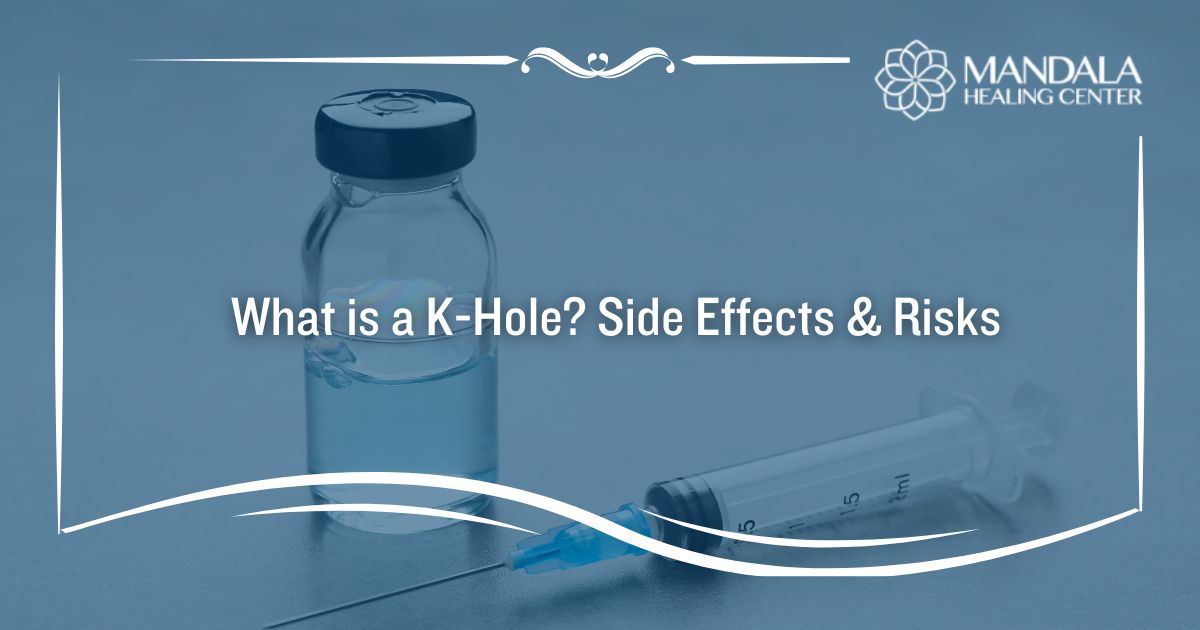Ketamine is a dissociative anesthetic drug that is used medicinally in a few different ways. It used to be used primarily by veterinarians as a short-acting anesthetic. However, it is now often used in smaller doses to treat mental health conditions in humans like treatment-resistant depression or post-traumatic stress disorder (PTSD).
While ketamine has medicinal uses, it is a known drug of abuse. Because it can produce hallucinogenic effects, you might hear about people abusing it in party, club, or rave scenes. The effects of ketamine include detachment from reality, euphoria, and memory loss.
If taken in high doses, users experience something referred to as a “K-hole.” Often compared to a near-death experience, falling into a K-hole causes out-of-body sensations and an inability to move or speak. While some people might be tempted to experience this type of high, doing so could be dangerous.
The dangers of K-holes include an increased risk of accidents, addiction, mental health issues, ketamine overdose, and a condition called hallucinogen-persisting perception disorder (HPPD).
What is a K-Hole?
When you take ketamine, it blocks a neurotransmitter in your brain known as glutamate. This leads to a decrease in activity in the part of your brain responsible for perception, emotion, and memory. In addition, ketamine can affect different areas of your brain that play a role in mood and pain sensations, leading to dissociation, hallucinations and altered sensory perception.
If you take a high dose of ketamine, you might experience a K-hole. As an out-of-body or near-death experience, K-holes cause you to enter a dissociative state. It might be hard to move, speak, or understand time and space as it relates to you.
If you are in a K-hole, you might appear catatonic to those around you. You might hear people describing the experience as feeling like floating, watching themselves from outside of their body, or in a dream-like state.
Side Effects of a K-Hole
K-holes cause intense feelings of being separated from your body. In other words, you will experience a wide range of dissociative effects. Not only does this phenomenon cause psychological effects, but it can lead to physical symptoms you should be aware of.
The common symptoms of a K-hole include:
- Detachment or dissociation from yourself and your surroundings
- Anxiety and feelings of panic
- Paranoia or delusions
- Hallucinations
- Confusion and disorientation
- Changes in sensory perception (i.e., light, sound, and time)
- Dizziness
- Nausea or vomiting
- Lack of coordination
- Changes in blood pressure and heart rate
If you take higher doses of ketamine, you might experience a K-hole. Sometimes, you will experience symptoms of psychosis, a condition that causes detachment from reality, hallucinations, and delusions. Usually, your symptoms will subside between 45 to 90 minutes after you consume ketamine.
What are the Long-Term Risks of K-Holes?
The effects of K-holes are usually temporary, subsiding after 90 minutes. However, abusing the drug long-term can increase your chances of experiencing both mental and physical health concerns.
The long-term risks of ketamine abuse include:
Increased Risk of Accidents
When you are in a K-hole, you might be unable to move or speak. If you can move, your coordination will be severely impacted. As a result, you have an increased risk of experiencing bodily harm or accidents.
Addiction
Abusing ketamine in large doses and frequently can increase your risk of developing an addiction. If you begin to feel like you need ketamine to function properly, you most likely have a substance use disorder. Unfortunately, ketamine addiction only opens you up to even more dangers, like financial strain, social isolation, health conditions, and life-threatening overdoses.
Psychological Harm
Another risk of frequent K-holes is developing mental health issues. Your pre-existing mental health conditions might worsen as well.
First, the effects of a K-hole can lead to anxiety, panic, and even paranoia. On the other hand, people abusing ketamine who have mental health conditions have an increased risk of developing psychosis. This is especially true for people with bipolar disorder, schizoaffective disorder, or schizophrenia.
Hallucinogen-Persisting Perception Disorder (HPPD)
When you routinely abuse a drug that causes hallucinogenic effects, you are at risk of developing hallucinogen-persisting perception disorder (HPPD). When you have HPPD, you will experience hallucinations even when you are sober. They are often referred to as hallucination “flashbacks.”
Respiratory Depression
Lastly, taking high doses of ketamine puts you at risk of overdosing. When you overdose on ketamine, it is usually due to respiratory depression. Ketamine can suppress your breathing to dangerously low levels.
If you believe you are experiencing a ketamine overdose, contact 911 immediately. Emergency medical services are necessary to survive a ketamine overdose.
Find Help for Ketamine Abuse and Addiction
If you or a loved one suffers from ketamine addiction, it’s time to consider professional help. Drug rehab programs like Mandala Healing Center can offer you the tools and support you need to achieve long-term sobriety.
At our rehab center, we ensure each client receives an individualized treatment plan that is solely based on their needs. Additionally, we approach addiction treatment with a compassionate and evidence-based attitude. As a result, your chances of lifelong recovery increase substantially.
Contact us today to learn more about our ketamine addiction treatment center.












